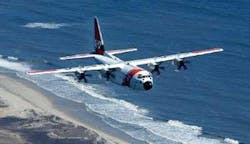by Ben Ames
MARIETTA, Ga. — The U.S. Coast Guard's massive Deepwater program to upgrade crucial technologies such as electronics and optoelectronics throughout the agency's land bases, ships, and aircraft, is not the only initiative to improve electronic technologies.
Outside the Deepwater program, Lockheed Martin workers in Marietta, Ga., delivered four HC-130J Super Hercules airplanes Oct. 31, and will deliver two more by the end of 2003. The planes fly out of Coast Guard Air Station (CGAS) Elizabeth City, N.C.
The Lockheed Martin C-130 turboprop, above, is a primary maritime surveillance aircraft of the U.S. Coast Guard. The aircraft is receiving a big communications upgrade as part of the Deepwater program.
Coast Guard planners use a fleet of 23 HC-130H long-range maritime patrol aircraft for surveillance and for search and rescue. They plan to replace all those aircraft with the new HC-130J by 2013.
The primary improvement is communications. "These aviation assets suffer from inadequate communications and limited access to mission-critical information," states the Coast Guard Web site. "Most cutters and aircraft communicate only by voice, lack real-time or near real-time access to essential operations databases and have limited ability to share tactical information, limiting situational awareness."
The new airplanes will be able to fly more diverse missions than their predecessors, encompassing law enforcement such as alien migrant interdiction, living marine resources, and counter-drug operations, as well as assisting the U.S. Department of Defense in emergencies.
Coast Guard leaders also have plans to upgrade the new planes, adding additional windows, inverse synthetic aperture sea search radar, flare tubes, forward-looking infrared/electro-optical sensors, gaseous oxygen for the crew, and enhanced communications.

